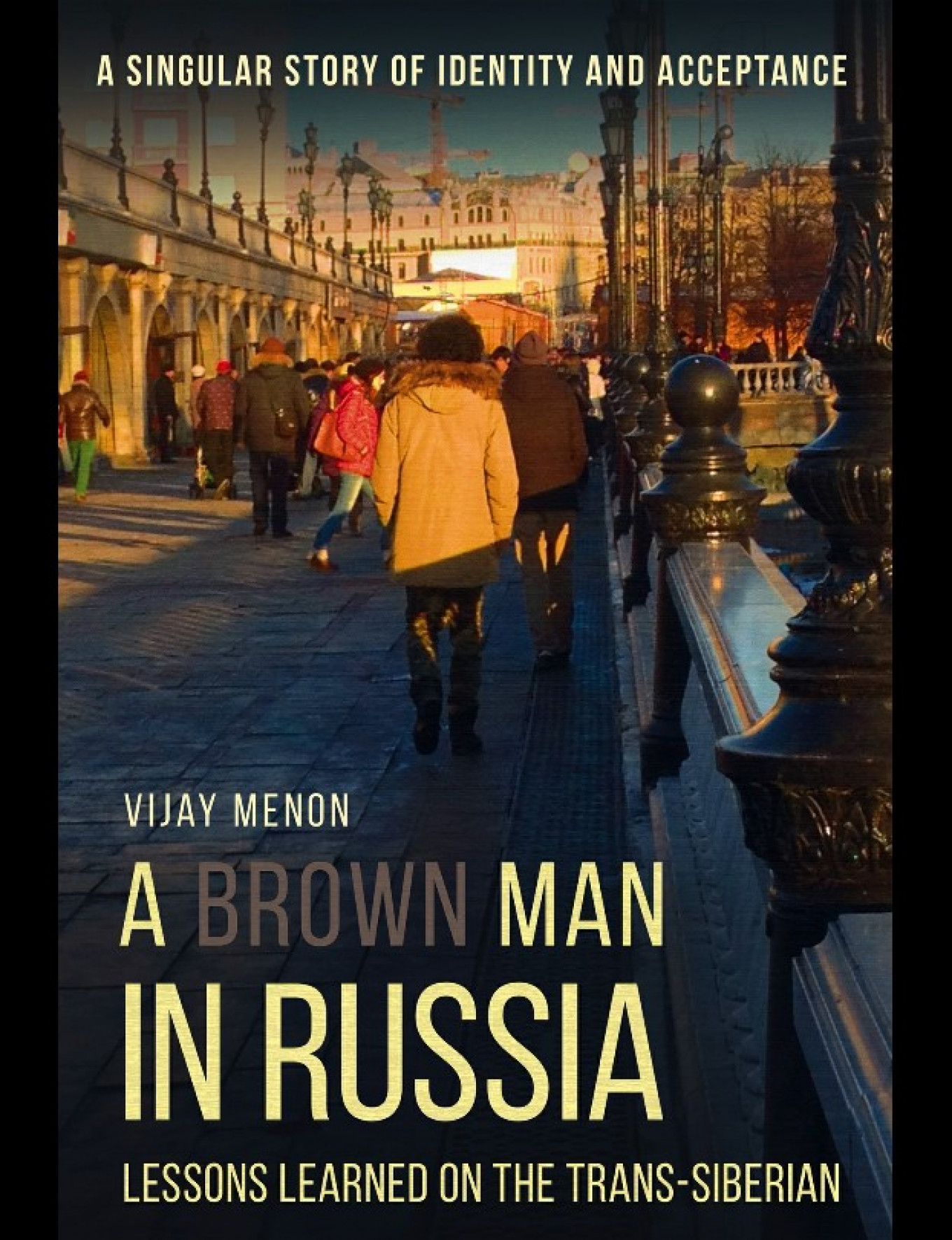As a brown woman who has lived in Moscow for over three years now, I must admit that I approached “A Brown Man in Russia: Lessons Learned on the Trans-Siberian,” a book about a young American’s journey through Russia to Mongolia in the depths of winter, with some skepticism. And indeed, encounters were familiar and suspicions were the same.
But I did relive my own first encounters in Russia as a brown woman and remembered when they started being incredibly tiresome and stopped being fun.
“A Brown Man in Russia” is also a great chance for any reader to take an honest look at your own Russian experience – whatever ethnicity you are – and compare how you first behaved to how you are now.
With this in mind, I sat down to chat with Vijay Menon, a young man from densely populated and diverse California who traveled to Russia on a whim and embarked on an epic adventure from Moscow to Mongolia on every backpacker’s dream — the Trans-Siberian.
When was the first time you felt like a “brown man in Russia”? Had you ever felt that way before?
It hit pretty quickly. My initial experience landing in the airport, going to the subway, going really deep into the system, trying to figure out where the exit sign is (and not knowing how to say exit) and frantically looking for someone who looks a little bit like me – hey maybe he knows English, maybe he’ll help me out? People were very dismissive, and that was the moment when I realized: Wow, ok, I am “other.”
But it was also walking through the subway later and feeling sort of like a celebrity and a zoo animal in some sense. You feel like you’re magnetic. [People in] St. Petersburg and Moscow were a bit more used to that, but as you go more east, they aren’t. And I’d never really had that experience: you feel trapped and you feel good, but you don’t know whether they’re laughing at you or with you.
One thing I’ve personally noticed is that it’s not always that you look different – it’s that the way you behave is different. Was there any point you started to feel a bit less foreign than before?
One of the things I noticed about uniquely being Russian is how not to attract attention to yourself, and one of the unique things about being American is attracting attention to yourself – being loud, purposefully being loud – embracing individuality and “I’m going to have a loud conversation because I want the person to hear it.”
So, there was a process of learning to move a little bit away from the brash braggadocio of American culture. But the other thing to do was more ownership of myself. I had gotten to a point where I would’ve immediately attributed mal-intention to any experience that made me feel uncomfortable, and then I started to realize I could differentiate and that there’s a really fine line between ignorance and prejudice. I started to realize that most [questions] were coming from a place of curiosity.
“We had entered Siberia in the heart of winter – and we had conquered it.” Do you think some of the conquered feeling you describe comes from the fact that it was something so vast, so unknown? What was it that excited you?
I’ve devised a sort of golden rule of travel for myself, which is the place should not only be unique to you, but you should be unique to the place as well. And as the world gets really interconnected and multicultural, it gets really hard to find places like that. I want to go to places where I’m unique to that place, because it fosters conversation and different points of view.
Siberia was that number one destination to meet that criteria, where you are completely unique to this place, and it was unique to me on so many levels – on the cultural, racial, even climate level – so all those things just engendered this feeling of: Here is a place I could have never imagined myself being in and going through it, surviving it and learning to navigate it without really even fully preparing for it. It’s sort of a euphoric feeling of conquering something that is just innate to yourself and is really hard to explain to other people. Other people will tell you you’re crazy, but it just fills you with some sort of personal satisfaction.
Your book includes many lessons throughout your trip, and what you got to know about Russians. What do you think the world, or the U.S. specifically, can learn about Russia from your experience?
My friend jokes that the title of the book should really be, “Brown man goes to Russia, is treated decently well and comes home happy.”
There were experiences that make me feel uncomfortable, but I want to relate, too, is that the majority of my experiences are actually filled with super nice and super genuine people, and I wouldn’t have been able to make it through that trip by myself — not speaking Russian — I wouldn’t have been able to make it without the help of other people.
I think Russian people are less gregarious and less outgoing than American people, but people are generally helpful. It doesn’t matter if they’re Russian, or German, or whatever stereotypes we have: Folks want to help. That’s the main takeaway.
This interview has been edited for length and clarity.

Chapter Two: You Are a Lottery Ticket
December 13, 2013 Moscow, Russia
It is difficult to come to grips with reality until you are fully immersed in the moment.
Such was the case as I stumbled through Domodedovo Airport, arriving at the unpleasant realization that I simply was not adequately prepared — neither emotionally nor physically — for this trip.
Not for the weather, nor for the culture, nor for the language — let alone for getting to the hostel.
In fairness, this is often my natural state. While so-called experts relentlessly sing the praises of preparedness, I have always prided myself on possessing a certain level of familiarity — comfort, even — with ambiguity.
There are manifold explanations for this, some reasonable and others more questionable.
On the sensible side, one must admit a certain cathartic effect that being plopped into an unfamiliar circumstance and getting away unscathed has on the human psyche. And so I thrived in impromptu speaking and parliamentary debate in high school and college — forums where preparation had no effect on outcomes and where success was exclusively a matter of do or die.
Perhaps more dubiously, another reason that I preferred the unencumbered route of non-preparedness was to shield myself from the disappointment that over-preparedness so often brings. Some of the most crushing defeats of my life have been in circumstances when I felt poised and ready, only to subsequently fall flat. Conversely, the greatest victories have often been the ones I least expect.
And so, I gradually convinced myself that preparation itself was overrated. At best, you succeed and it feels that much better because you didn’t envisage it. At worst, you fail — but at least you could honestly say that you expected just as much.
I have a tendency to be this way.
In a family of worrywarts, my mother often chastised me for my ostensible lack of caring. It’s not that I enjoyed tormenting her. Rather, I just never saw the point in worrying. As Epictetus opined in The Art of Living, the key to a happy life is to ignore events that exist outside of one’s control.
The logical flaw, nonetheless, was that these specific circumstances — the set of conditions I found myself facing in this unfriendly, foreign airport — had not been outside of my control. I had read about Russia. I knew that learning the Cyrillic script would be a boon in my travels around the country. And yet I had willingly chosen to blithely ignore this advice.
In my previous backpacking experiences, I had relied upon someone knowing English — generally, the folks under thirty — to bail me out. But in Russia, things seemed slightly different.
Put simply, I had been lazy. And no amount of mental sophistry was going to save me now.
Here’s what I knew. I needed to get to a hostel called Gallina’s Flat. I also had a street address written in Cyrillic that, to my untrained eye, may just as well have been inscribed in Egyptian hieroglyphics. And I did not have a cellular or Internet connection. Armed only with these two items, I proceeded out of the airport and attempted to track down Gallina’s pad.
Stepping outside of the double doors, I was met with a blast of cold air like I had never felt before. Hailing from California, I faltered in the face of this icy front. At college in North Carolina, I was the one who frolicked outside taking pictures and throwing snowballs during the occasional light dusting, while the pretentious Northeasterners querulously mumbled derisively about “those West Coast kids.”
But this — this was a whole different ballgame. One that would unequivocally legitimize my snow induced curiosity, and likely have the New Yorkers galloping about as well.
All I wanted to do now was board a train to the city and submit myself to its glorious indoor warmth.
Alas, I had no conception of how to purchase a ticket or find out which trains went where. After about five minutes of mildly panicked pacing back and forth on the outdoor platform, I noticed a carriage pulling up. Faced with a choice between doodling outside in the cold any longer and hopping onto a random train — potentially to nowhere — I chose the latter.
In my mind, I made some rough estimations. Generally airports are somewhere between thirty to sixty minutes outside of the city, so I should give this train half an hour before I started to scan vociferously for signs of city life. Of course, there was always the possibility that I had hopped on a train headed the opposite direction — outside of the city. But given the alternative of waiting outside in the freezing cold to figure that out, I judged that this coin toss was a worthy gambit indeed.
With each passing face on the train, I made the same stereotypical judgments that others likely foisted upon me. “She looks,” for instance, “like a city slicker. I must be on the right train.”
To what degree these estimates were guided by blind hope rather than intellect, I couldn’t say for certain. At any rate, it was far too much for comfort.
Approximately half an hour into the ride, though, my fears were allayed, if ever so slightly. Signs of town began to come into view.
Comparing my hieroglyphic directions to the signage, it appeared that I had arrived by pure chance at the correct subway station. But while I breathed a figurative sigh of relief upon miraculously clearing the first hurdle of my journey, I hardly realized in the moment that my woes were just beginning.
As I looked to leave the subway, it dawned on me, somewhat tragicomically, that I did not know the Russian word for “exit.”
“No matter,” I assumed. “I’ll just follow the crowd of people to the nearest escalator and depart.”
Unfortunately, it wasn’t quite so easy. A bit of context is in order.
The Moscow subway system is a modern marvel. It is the deepest underground subway system in the world. Indeed, sitting on the escalator from top to bottom generally takes between three and five minutes — it’s that deep. Throw into play an intricate transfer system, multiple train lines, and not even a rudimentary understanding of the Russian language, and you had me — an indescribably lost individual with no means of human communication, let alone Internet or telecommunications access.
Again, I began to resort to heuristics. I looked desperately for a person of color — someone I assumed could likely speak English and help me out. It did not work, if only for the reason that there were no other people of color.
I walked up to station managers and police officers, feebly offering the word “exit?” Cold and unhelpful eyes stared back at me.
For an interminable amount of time, I wandered through the station — up a dizzying array of escalators and back down again, following streams of Muscovites who all seemed to be making transit connections rather than heading home. The only solace was in the fact that here, deep underground, I was shielded from the cold.
After over an hour of perambulation, my efforts finally bore some fruit. I emerged, by chance, from the depths of Moscow’s subway into the city. Never had I been happier to be greeted by gale force winds and piercing snow. But there was precious little time to rejoice. It was time to conquer stage three — navigating from the underground subway system to Gallina’s Flat.
This was no quotidian task. I was dealing with cold like I had never experienced. Moreover, I had never walked on frozen pavement before. Every few steps I stumbled, unaware of even the basics, like how to identify and sidestep black ice.
After much duress, I finally reached a location that I believed to be Gallina’s Flat. But when I entered the dilapidated parking lot, I could not locate appropriate signage, let alone a phone to buzz. I wandered outside again, disenchanted and alone, as the curtain of darkness began to descend upon Moscow.
As I stumbled up and down the street in vain pursuit of the place, I finally slipped and fell hard on my tailbone, letting out a guttural shout of frustration. At this moment, a shopkeeper who had been observing me roaming the street came out of his shop and asked, “Hostel?”
“Yes,” I nodded vociferously, warming heavily to my first human contact since the border examination at the airport.
He pointed at a broken-down door with a rusted button. I raced over to push it, and a welcome voice came over the intercom — that of my friend Avi.
“Yo, man! You here?” Instantly, my worries dissipated and my regrets seeped away.
In spite of those initial trials and tribulations, I had arrived.
Excerpted from “A Brown Man in Russia: Lessons Learned on the Trans-Siberian” published by Glagoslav Publications.
Copyright © Vijay Menon and © Glagoslav Publications. Used by permission. All rights reserved.
For more information about Vijay Menon and his book, see the publisher's website.
A Message from The Moscow Times:
Dear readers,
We are facing unprecedented challenges. Russia's Prosecutor General's Office has designated The Moscow Times as an "undesirable" organization, criminalizing our work and putting our staff at risk of prosecution. This follows our earlier unjust labeling as a "foreign agent."
These actions are direct attempts to silence independent journalism in Russia. The authorities claim our work "discredits the decisions of the Russian leadership." We see things differently: we strive to provide accurate, unbiased reporting on Russia.
We, the journalists of The Moscow Times, refuse to be silenced. But to continue our work, we need your help.
Your support, no matter how small, makes a world of difference. If you can, please support us monthly starting from just $2. It's quick to set up, and every contribution makes a significant impact.
By supporting The Moscow Times, you're defending open, independent journalism in the face of repression. Thank you for standing with us.
Remind me later.







